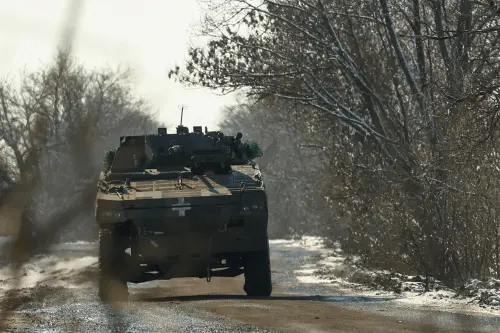In London on Feb 20, Ukraine's international investors are reeling from a week of escalating tensions initiated by the U.S. President aimed at the country and its leader, Volodymyr Zelenskiy. This has led many to reassess the future outlook.
Recently, Ukraine's bonds faced significant losses, the most severe in over a year. This downturn followed President Trump's surprising direct communication with the Russian President, and his subsequent labeling of Zelenskiy.
The uncertainty surrounding the potential peace agreement for Kyiv is casting doubt among politicians and investors. This skepticism extends to concerns about a peace deal comparable to the ineffective post-Crimea agreement that failed to prevent the subsequent Russian invasion in 2022.
Daniel Moreno from Mirabaud remarked on the bleak outlook, "The future of Ukraine looks a lot more murky than it did a few weeks ago." There are apprehensions that an inadequate peace treaty lacking essential security guarantees could deter international institutions and private investors from aiding Ukraine's reconstruction efforts.
JPMorgan analysts estimate the reconstruction needs at a minimum of $35 billion annually for the next decade, potentially escalating to $50 billion due to Russia's recent attacks on energy infrastructure.
With doubts hovering over Ukraine's economic growth prospects, bonds, including those with 'step up' payments triggered by exceptional growth, have experienced significant declines. Despite this recent turmoil, the bonds still show positive returns over the year, albeit with heightened risks.
Viktor Szabo, a portfolio manager at abrdn, acknowledged the heightened risks triggered by Trump's recent actions, pointing out the rising possibility of Ukraine rejecting any deal crafted by Trump and Putin.
Kaan Nazli from Neuberger Berman warned about the impact of thin trading on bond prices, emphasizing Russia's unclear stance that continues to complicate the formation of a clear market view.
Goldman Sachs emphasized that substantial payouts from GDP-driven growth are contingent on a prompt and sustainable resolution to the conflict. The ongoing exchange between Trump and Zelenskiy, coupled with the exclusion of European and Ukrainian leaders from U.S.-Russia discussions, is undermining confidence in any prospective ceasefire agreement.
In conclusion, Moreno from Mirabaud expressed skepticism about the current appeal of investing in Ukraine, given the delayed prospects for peace and constructive reconstruction efforts.
